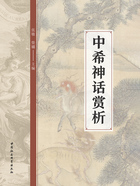
Part 3 Reflections
1.Vocabulary Expansion
1)cosmogony:_______________
2)Dijiang:_________________
3)Torch Dragon:____________
4)Pangu:___________________
5)Theogony:________________
6)Olympus:_________________
7)Titans:__________________
8)Chaos:___________________
9)Aether and Aër:__________
10)Titanomachia:___________
11)Hecatoncheires:_________
2.Appreciation
1)曰:遂古之初,谁传道之?
上下未形,何由考之?
冥昭瞢暗,谁能极之?
冯翼惟象,何以识之?
明明暗暗,惟时何为?
阴阳三合,何本何化?
圜则九重,孰营度之?
惟兹何功,孰初作之?
斡维焉系,天极焉加?
八柱何当,东南何亏?
九天之际,安放安属?
隅隈多有,谁知其数?
天何所沓?十二焉分?
日月安属?列星安陈?
出自汤谷,次于蒙汜。
自明及晦,所行几里?
夜光何德,死则又育?
厥利维何,而顾菟在腹?
《楚辞·天问》
2)Chasm it was,in truth,who was the very first;she soon
Was followed by broad-breasted Earth,the eternal ground of all
The deathless ones,who on Olympos’s snowy summits dwell,
And murky Tartaros hidden deep from Earth’s wide-open roads,
And Eros,the most beautiful among the deathless gods—
Limb-loosener he is of all the gods and of all men:
Thought in the breast he overwhelms and prudent planning;then
Out of Chasm Erebos and black Night both were born,
And then from Night came Ether and came Day as well in turn;
For Night conceived them,having joined with Erebos in love.
Now Earth first brought forth Ouranos,the starry Sky above,
An equal to herself,so he could cover her around,
And she might serve the deathless gods as firm,eternal ground.
She bore the hills,the gracious haunts of mountain goddesses then—
The Nymphs,who range the wooded hills and up and down each glen;
And without sweet desiring love,she bore the barren Sea,
Pontos,the raging salt-sea swell;and when she had lain with Sky,
She bore deep-eddying Ocean and Koios and Kreios too,
Hyperion,father of the Sun,Iapetos also,
And Thea and Rhea and Themis and,in turn,Mnemosyne,
Phoebe the golden-crowned one,Tethys lovely to see;
And after these the youngest came,Kronos,crooked and sly,
The cleverest of all her children and his father’s enemy.
Hesiod’s Theogony
3.Discussion
1)Compare Chinese and Greek etiological myths of cosmogony.What kind of creation myth do they belong to?
2)What kind of world views are revealed in Chinese and Greek etiological myths of cosmogony?
[1] cosmogony [kɒzˈmɒɡəni] n.宇宙的产生
[2] monolithic [ˌmɒnəˈlɪθɪk] adj.完全统一的
[3] primeval [praɪˈmiːvl] adj.原始的
[4] nebulous [ˈnebjələs] adj.朦胧的
[5] 《神谱》,古希腊诗人赫西俄德著,描写宇宙和神的诞生,讲述从地母盖亚诞生直到奥林匹亚诸神统治世界的历史,编者注。
[6] Chaos [ˈkeɪɒs] n.卡俄斯(希腊神话中的混沌之神)
[7] Gaia(or Gaea)[ˈɡaɪə] n.盖亚(希腊神话中的大地女神,众神之母)
[8] Tartarus [ˈtɑːtərəs] n.塔耳塔洛斯(希腊神话中地狱的化身)
[9] Eros[ˈɪərɒs] n.厄洛斯(希腊神话中的爱神)
[10] procreate [ˈprəʊkrieɪt] vt.生育
[11] Erebus [ˈerəbəs] n.厄瑞玻斯(混沌之子,永久黑暗的化身,代表冥土的黑暗)
[12] Nyx [ˈniks] n.尼克斯(司夜女神,夜的化身)
[13] Aether [ˈiːθə] n.埃忒耳(太空神,在希腊神话中是“太空”的拟人化神)
[14] Hemera [ˈhɛmərə] n.赫墨拉(白昼之神)
[15] azurite [ˈæʒʊˌraɪt] n.石青
[16] orpiment [ˈɔːpɪmənt] n.雌黄
[17] The Classic of Mountains and Seas,translated into Modern Chinese by Chen Cheng,translated into English by Wang Hong and Zhao Zheng,Changsha:Hunan People’s Publishing House,2010,p.55.
[18] Zhuangzi,Chuang-tzu,trans.by Feng Youlan,Beijing:Foreign Language Teaching and Research Press,2012,pp.99-100.
[19] The Classic of Mountains and Seas,p.311.
[20] limpid [ˈlɪmpɪd] adj.透明的
[21] turbid [ˈtɜːbɪd] adj.浑浊的
[22] peal [piːl] n.鸣响
[23] marrow [ˈmærəʊ] n.骨髓
[24] Anne Birrell,Chinese Mythology:An Introduction,pp.32-33.
[25] Uranus [jʊˈreɪnəs] n.乌拉诺斯(古希腊神话中的第一代神王)
[26] veneration [ˌvenəˈreɪʃn] n.尊敬
[27] Oceanus [oʊˈsiənəs] n.俄亥阿诺斯神(海洋之神,泰坦神族的一员)
[28] Aër(Air)[eə] n.埃尔(大气神)
[29] Nephelae [ˈnefəli] n.涅斐勒(云女神)
[30] Pontus [ˈpɑːntəs] n.蓬托斯(海洋之神)
[31] Nereus [ˈniəriəs] n.涅柔斯(海洋之神)
[32] Thaumas [ˈθɔːməs] n.陶玛斯(海洋之神)
[33] Phorcys [ˈfɔːrsɪs] n.福耳库斯(海洋之神)
[34] Keto[ˈkitəu] n.刻托(半蛇半鱼的海怪,是叵测的大海给人类带来的危险的化身)
[35] Eurybia [juəˈribiə] n.欧律比亚(女海神,蓬托斯与盖亚之女)
[36] Eos [ˈiːɔs] n.厄俄斯(黎明女神)
[37] Briareus [braiˈɛəriəs] n.布里亚柔斯(百手三巨人之一)
[38] Cottus [ˈkɔtəs] n.科托斯(百手三巨人之一)
[39] Gyges [ˈdʒaidʒiːz] n.古阿斯(百手三巨人之一)
[40] Hecatoncheires [ˈhɛkəˌtɒŋkəris] n.赫卡同克瑞斯(希腊神话中的百臂巨人)
[41] Coeus [ˈsiːəs] n.科俄斯(泰坦神族的一员)
[42] Crios(or Krios in ancient Greek)[ˈkraiəus] n.克利俄斯(泰坦神族的一员)
[43] Hyperion [haɪˈpiəriən] n.亥伯龙神(泰坦神族的一员)
[44] Iapetus [aɪˈæpətəs] n.伊阿佩托斯(希腊神话中十二提坦之一)
[45] Cronus [ˈkroʊnəs] n.克罗诺斯(泰坦巨人之一,天神乌拉诺斯和地神盖亚的儿子,他夺取了父亲的王位,后王位又被其儿子宙斯夺走)
[46] Theia [ˈθaɪə] n.忒伊亚(Hyperion之妻,太阳神Helios之母,泰坦巨人之一)
[47] Rhea [ˈriːə] n.瑞亚(众神之母,泰坦巨人之一,掌握时光流逝的女神)
[48] Themis [ˈθiːmis] n.西弥斯女神(正义和秩序女神,泰坦巨人之一)
[49] Mnemosyne [niːˈmɔzini] n.摩涅莫辛涅(记忆女神,泰坦巨人之一)
[50] Phoebe [ˈfiːbɪ] n.福柏(希腊神话中的月亮女神)
[51] Tethys [ˈtiːθɪs] n.泰西丝(女大力士,大海女神)
[52] abhorrence [əbˈhɒrəns] n.痛恨
[53] dethrone [diːˈθrəʊn] vt.废黜
[54] Hades [ˈheɪdiːz] n.哈得斯(宙斯与波塞冬的兄弟,希腊神话中的冥王)
[55] Poseidon [pɒˈsaɪdən] n.波塞冬(海神)
[56] Zeus [zjuːs] n.宙斯(希腊最高神,众神和众生的主宰)
[57] Hestia [ˈhɛstɪə] n.赫斯提(司炉灶的女神)
[58] Demeter [dɪˈmiːtə] n.得墨忒耳(司农业、丰饶、婚姻之女神)
[59] Hera [ˈhɪərə] n.赫拉(婚姻与生育女神,古希腊神话中的第三代天后,宙斯之妻)
[60] Crete [kriːt] n.(希腊)克里特岛
[61] Amalthea [ˌæmælˈθiːə] n.阿玛耳忒亚(用山羊奶喂养婴儿宙斯的仙女)
[62] nectar [ˈnektə] n.[植]花蜜
[63] ambrosia [æmˈbrəʊzɪə] n.(希腊罗马神话)神仙的食物
[64] Metis [miːtis] n.墨提斯(聪慧女神)
[65] circumvent [ˌsɜːkəmˈvɛnt] vt.<古>欺骗
[66] Cyclops [ˈsaɪklɒps] n.复数形式(Cyclopes),库克罗普斯(古希腊神话中的独眼巨人)
[67] Brontes [ˈbrɒntəs] n.布戎忒斯(独眼巨人,雷神)
[68] Steropes [ˈsterəʊps] n.斯忒罗佩斯(电神)
[69] Pyracmon [ˈpirikmən] n.派拉刻蒙(霹雳神)
[70] dispatch [dɪˈspætʃ] vt.派遣
[71] Titanomachia [ˌtaitəˈnɔməki] n.泰坦之战(指希腊神话中泰坦神族与奥林匹斯神族为争夺宇宙霸主地位而展开的战争)
[72] E.M.Berens,The Myths and Legends of Ancient Greece and Rome,London:Blackie & Son,1880,pp.11-17.